- Home
- Charles de Lint
Trader Page 5
Trader Read online
Page 5
I don’t find Zeffy’s name anywhere in the book, but there’s a Tanya listed under the Bs for Burns. So she’s the one who has the relationship with Devlin. That makes sense, considering her reaction out in the hall and later on the curb. Zeffy would be her friend then, rather than Devlin’s.
That makes me feel better, knowing that Zeffy at least had the taste not to be in a relationship with the sort of person Devlin was proving to be. I can’t figure out why Tanya would either, but that doesn’t seem very important. I hesitate a moment, then stick the address book in my pocket and shut the drawer.
Back at the front door of the apartment I test the keys until I find the one that fits. I drop the key chain into my pocket. Stepping out into the hall, I shut the door behind me, checking to make sure that the lock has caught. It isn’t until I’m outside on Grasso Street that I realize I don’t have any money except for the handful of change I took from the night table. I gave all of Devlin’s folding money to Zeffy and I can’t even go to a bank machine with one of his cards because there’s no credit left on them.
I count the change, but there’s only eighty-six cents. Not enough for the subway or a bus. Certainly not enough for a cab. That means I have to hike clear across town.
Sighing, I start off. I make a point of it to avoid looking at my reflection in store windows as I pass.
8 ZEFFY
In the end it wasn’t Tanya who told Jilly about the morning’s odd encounter with Johnny, but Zeffy. She and Jilly had decided to get some fresh air for their midmorning break and had walked down the short alleyway behind the café, then struck out across a small strip of lawn to where they could sit by the river. Dangling their legs over the slow-moving water, they munched on apples rescued from a crumble the cook was planning for the lunch dessert menu and shared a companionable silence.
That was one of the things Zeffy liked about Jilly. She was easy to talk to, but unlike too many people Zeffy knew, she never seemed to feel the need to fill a quiet moment with some inane comment, simply to keep a conversation going.
They didn’t see much of each other outside of work, mostly because they ran with different crowds. Jilly was older than Zeffy by a dozen years or so, but she always seemed younger. It wasn’t so much because of the way Jilly acted so much as that she’d managed to maintain the youthful exuberance that most people, even in Zeffy’s own twentysomething age group, appeared to outgrow—along, Zeffy often thought, with the ideals and dreams that were so clear when you were young, but that the world inexorably wore down to such an extent that if you stumbled across them in an old diary or a scrapbook, you’d barely recognize them anymore.
Jilly dressed young, too—or perhaps timelessly was a better way to put it, with her penchant for loose clothing and clunky shoes. “I go in and out of style” was how she put it in her usual offhand manner. With her, the scruffy look simply added to her charm. She was slender, with a thick tangle of brown hair often piled carelessly on the top of her head, and pale blue eyes, electric as sapphires. A half-inch or so shorter than Zeffy, she was an enchanting combination of diminutive flower fairy and street gamine.
She was also a fairly successful artist, showing up for work half the time with paint all dried on her fingers or speckled in her hair, and she’d been at Kathryn’s forever, or so it sometimes seemed. Zeffy could remember seeing her there when she and Tanya were still attending nearby Butler University. With her work hanging in galleries all over town, she didn’t really seem to still need to work at the café, but when Zeffy asked her about it once, Jilly explained, “I get a little claustro, cooped up in my studio for too long. This gives me an excuse to get away. And besides, I like meeting people.” Which was an understatement if Zeffy had ever heard one. Sometimes she thought Jilly knew every second person in the city—and if not them, then certainly their brother or their sister.
“Remember Sophie?” Jilly asked out of the blue.
She glanced at Zeffy, so Zeffy nodded. Sophie was an artist friend of Jilly’s she’d met at the opening of a show that Sophie, Jilly and some other women had put on at The Green Man. It had dealt with child abuse and made a great impact on Zeffy at the time, particularly because one of the artists, an abused street kid that Jilly had taken under her wing, had died just before the show.
“Well, she’s into another one of her serial dreams,” Jilly went on. “This time she’s met a kind of travel agent in that dream city of hers, this woman named Ashling who runs a bureau of dreams where you can go in and reserve a dream to wherever you want to go.” Jilly laughed. “So long as the place isn’t overbooked, that is.”
Zeffy laughed with her. “So naturally you want to go.”
“Naturally. You, of course, being the pragmatist you are, can’t accept the idea. I’m sure, so you’d never even get in the door, little say get to take the trip, but I’m holding out for a chance myself.”
“I’m only a pragmatist compared to you. Everybody else I know thinks I’m flaky.”
“Yes, well,” Jilly said. “There’s that. Anyway, I try to will myself to meet this Ashling every time I go to sleep, but nothing ever happens.”
“Surprise, surprise.”
Jilly gave her a considering look, touched with a dreamy wistfulness. “Would you go?”
“It’s only a dream, isn’t it?”
Jilly nodded.
“Well, I suppose I would,” Zeffy said. “Only, it wouldn’t be real, would it? So it wouldn’t hurt to go, but you wouldn’t gain anything from it either.”
“You’d gain experience. Remember what the Buddha said: ‘We do not learn by experience, but by our capacity for experience.’ Which I take to mean that we should have a willingness to keep an open mind, no matter how strange, or even improbable, things might appear to be.”
“But it’s still not real.”
Jilly smiled. “Well, here’s the question Sophie always asks me: If you do something in a dream—let’s say you kill somebody—are you still guilty of murder?”
“Of course not.”
“I don’t mean according to the laws of this world,” Jilly said. “I mean according to one’s own inner laws—the beliefs by which we live our lives. If you’re capable of killing in a dream, isn’t it possible you could kill someone in real life, too?”
“Okay,” Zeffy said. “I see your point. But while we’re on the topic of the strange and the unusual—”
“My field of expertise!” Jilly cried. “How many points is this question worth?”
Zeffy laughed. “Let me ask you this: If you meet someone you know, and they don’t know you anymore...” She hesitated, wondering how to put it. “If the way they talk is different, the way they hold themselves and move, if everything about them is different...are they still the same person?”
“This,” Jilly said, obviously intrigued, “doesn’t sound so much like a hypothesis as something that might have actually happened to somebody we know.”
“Well...”
“Oh, ’fess up. I’m dying to hear about it.”
So Zeffy related the morning’s experience to her. She explained her own belief, that it was all just a really good act, and then how Tanya had gone from thinking Johnny might have amnesia to his having been “replaced” by someone or something else.
“God, this sounds so goofy,” Zeffy said when she was done. “I don’t even know why I brought it up in the first place. Of course he was just putting on an act. Why, is another story.”
“I never much liked him,” Jilly said.
That surprised Zeffy. Often it seemed that Jilly could find something good to say about anyone.
“Oh, it wasn’t just because of how he’s treated Tanya,” Jilly went on. “It’s more...There was something deeply creepy about him. I can’t quite put my finger on what...”
“Maybe it’s that he’s sociopathic,” Zeffy said.
Jilly shook her head. “I wouldn’t go that far. But, he does seem inordinately focused on himself to the exclusion
of everybody else around him. But not criminal.”
“Not criminal,” Zeffy agreed. “At least—” She lowered her voice dramatically. “—by this world’s laws.”
“Yeah, I wonder what he dreams of.”
Zeffy grimaced. “I don’t think I’d want to know.”
“But he has to have some redeeming qualities, or why would Tanya have gone out with him for so long?”
“He just knows which buttons to push with her,” Zeffy said. “And besides, they were pretty much finished even before this morning.”
“But still...”
Zeffy sighed. “Lord knows I love the woman, but sometimes I think she’s a born victim. She’s always attracted to the wrong guys. She always gets mixed up in the bad relationships.”
“It’s sad isn’t it?” Jilly said. “I mean, for her, of course, but also for those around her, to have to stand by and watch it happen time and again. You have to wonder where it all begins.”
“Ask her parents,” Zeffy said. “All those beauty pageants they had her in. And then the modeling and stuff. You’ve got to come out of that feeling like so much meat and not much else. When she didn’t place first, or she’d lose some catalogue job, they were all over her. What’s that going to do for your self-esteem? One minute it’s all about how much they love her and how she’s the most beautiful thing on the planet, the next they’re screaming, telling her how useless she is. It may not be physical abuse, but it still leaves scars.”
A troubled look came into Jilly’s eyes. “Yeah, I guess we’ve all been there, dealt with that kind of thing on one level or another. If it didn’t happen to us, it happened to someone we know.”
Zeffy thought about that show that Jilly and her friends had done. She’d never talked to Jilly about the source of the work Jilly had hung in the show, but then Jilly never spoke of her past. Life seemed to begin for Jilly with when she attended Butler U.—years before Zeffy went to the university herself. Everything before that was a mystery, like the part in old maps that read, “Here there be dragons.”
I guess we’ve all been there. Where the dragons are. Jilly was so cheerful and good-natured that Zeffy couldn’t imagine anything so terrible lying in her past.
“The thing that I can never figure out,” Zeffy said finally, “is how that kind of thing makes some people stronger and others victims for the rest of their lives.”
Jilly nodded. “All depends on who you are, I guess. Nobody can really tell how they’ll react to a crisis until it’s upon them.” She sighed. “Jeez, listen to us. What a depressing topic of conversation for such a beautiful day.” She turned away from her view of the river to look at Zeffy. “So tell me. Why’d you never let on that you’ve got a gig this weekend?”
Zeffy ducked her head to hide a blush. “I don’t know. I just don’t want to be pushy I guess.”
“The only thing you’re not pushy about is your music,” Jilly told her with a laugh.
“Whatever. How’d you find out anyway?”
“Tanya asked me what time I was going to get to the club. When I said I didn’t know anything about it, she put her hand over her mouth and wouldn’t tell me anything else.”
“I kind of swore her to secrecy,” Zeffy said.
“Why ever for?”
“Is that even a word?”
“It’s a phrase,” Jilly said, “and don’t change the subject.”
“I just didn’t want you all to feel obliged to come.”
“Oh, like you feel obliged to come to my openings or Wendy’s readings.”
“That’s not the same,” Zeffy said.
“Ah.”
“Okay, already. I’m opening for Amanda Blackstone’s new band at the YoMan. Thirty-minute sets both Friday and Saturday night.”
“So that’s good—right?”
Zeffy grinned. “Well, yeah. Of course it is.”
“They’re really up-and-coming from what Geordie tells me, so there’ll be a good crowd.”
“Probably not until they come on.”
“So we’ll all come to give you some moral support—unless you’d rather we didn’t, being so shy and reclusive now.”
Zeffy gave her a light punch on the arm. “I said I was sorry I didn’t tell you about it.”
“Didn’t.”
“Well, I’m saying it now.”
“Apology duly noted and accepted,” Jilly said. “Is our break over?”
Zeffy glanced at her watch. “We’re five minutes late.”
“Which is like being on time for me. Come on. Let’s go.”
As they walked back down the alleyway toward the café, Jilly turned to Zeffy.
“I’m still thinking about Johnny Devlin,” she said. “Did you ever wonder if maybe Tanya was right? Maybe there is a space alien in his head right this minute and the real Johnny is sleeping in a pod in somebody’s basement?” She had a sparkle in her eyes, but Zeffy couldn’t tell if she was teasing or being serious. With Jilly you just never knew.
“Oh please,” she said.
“But what if?” Jilly asked.
“I’d think he deserved it,” Zeffy said. “Being in a pod, I mean. And I’d feel sorry for the poor alien trying to make sense out of Johnny’s life.”
9 MAX
I moved, the spring just past. For years, even when I could afford to do better for myself, I’d lived in the basement apartment of a brownstone tenement in Foxville, sharing my workspace and living quarters with roaches the length of fiddle pegs and rats that I never saw, but could often hear scrabbling about in the walls. What kept me there wasn’t so much masochism as inertia, a simple inability to face the idea of packing up and moving some twelve years of accumulated tools, wood, instruments, books, recordings, furniture and other belongings.
The turning point came when I woke up one morning, face-to-face with a rat that seemed to be the size of a tomcat. The rodent froze when I blinked my eyes open, and for a long moment it crouched there, motionless on my bed, quivering nostrils no more than a few inches from my nose. I don’t know which of us was more startled at my bellow of disgust when I lunged from the bed. We hit the floor at the same time, the rat disappearing into the living room in a flash of greasy brown fur, nails skittering on the floor. By the time I reached the door, it was nowhere to be seen. I didn’t waste any time looking for it, but walked through to the kitchen instead, picked up the phone and called a Realtor.
Within two days, she found me a new apartment in Lower Crowsea, in the old part of the Market that backs onto the Kickaha River. Packing everything I owned—the accumulation was far worse than I’d thought—and then setting it all up again in the new place had been as monumental a task as I’d imagined it would be. But now that I’m moved in and have gotten to know the area, I’m so enamored with my new neighborhood that I can’t figure out what took me so long to relocate. Living here, I feel as though I’ve moved to Europe, instead of another part of Newford; as though I’ve been magically transported into one of those idyllic French or German towns, hundreds of years old, that my father and I explored on the trip we took overseas the year before he died.
For this part of the Market has a real Old World atmosphere, with its cobblestones underfoot and the turn-of-the-century stone buildings that lean one against the other, joined in places by arches, shared courtyards, overhead walkways and tiny gardens. Its maze of twisting streets is too narrow for cars, so the only traffic is by foot or bicycle—which is probably what’s saved it from the yuppie renovations that have overtaken the rest of the Market. Those yuppies do love their BMWs, as Nia likes to say.
Nia is the sixteen-year-old daughter of Lisa Fisher, the woman who has the apartment above mine. She’s dark-haired like her mother, but keeps her hair long, bangs covering her forehead. With her penchant for black clothing and her pale complexion, she’d come off as just one more neo-Gothic except she has far too much good humor. If her lips aren’t smiling, her eyes are. And she’s decidedly eccentric—a true bohemian,
though the days of the Beats are long gone. She likes jazz, poetry, art, coffee and hanging around in my shop while I’m working, discussing and partaking of all of the above. Broad in her opinions, she eloquently delivers monologues on whatever particular subject happens to interest her at the moment while I work away at my bench, repairing a fiddle, making a guitar, refretting a banjo.
When I ask her why she avoids going to school as much as she does, she tells me it’s because the institution has nothing worthwhile to teach her, that there’s more to life than getting a passing grade, and besides, knowledge is to be treasured, literature to be cherished. Discussion is fine—among one’s peers, of course—but memorizing by rote, or appreciating something only within the strict context of the schools board’s curriculum, makes her physically ill.
I enjoy her visits—it’s better than having a radio—and I sense she needs an adult besides her mother with whom to share confidences, an adult who accepts her at face value. Or maybe she’s simply looking for a father figure, her own father having walked out of her life before she had the opportunity to get to know him. She doesn’t seem to have any friends in her own age group for all that she’s quite pretty in her own esoteric fashion. For those reasons, and because I genuinely like her, she’s always welcome. So long as she lets me work. And even if she does tend to lecture me sometimes about my eating habits—too many sweets, she likes to tell me—and the fact that I own a vehicle, which came up the first time she made mention of the yuppies and their BMWs. I have an old Dodge van that I park in a garage I rent on Lee Street, within easy walking distance of the shop.
“But I’ll forgive you both,” she informed me.
“Awfully big of you.”
“It’s only because I know you guys need your candy and your toys.”
I had to smile. “Your mother tell you that?”
“No. That was pretty easy to figure out on my own. But you know you really should try to shop locally. Then you’d never even need the van.”
“I do when I can.”

 Widdershins
Widdershins The Ivory and the Horn
The Ivory and the Horn Yarrow
Yarrow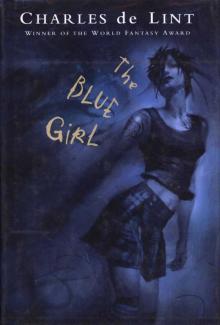 The Blue Girl
The Blue Girl Spirits in the Wires
Spirits in the Wires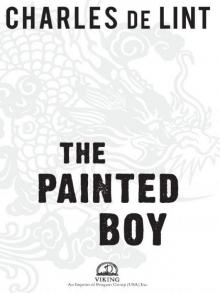 The Painted Boy
The Painted Boy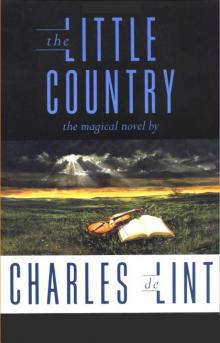 The Little Country
The Little Country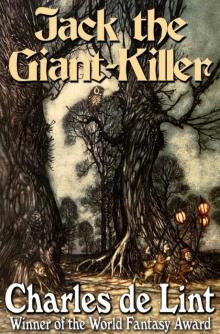 Jack of Kinrowan: Jack the Giant-Killer / Drink Down the Moon
Jack of Kinrowan: Jack the Giant-Killer / Drink Down the Moon Moonheart
Moonheart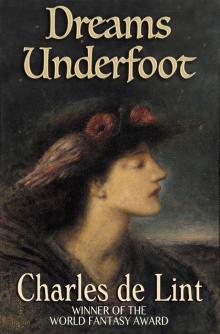 Dreams Underfoot
Dreams Underfoot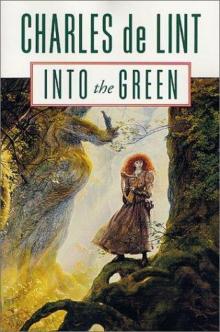 Into the Green
Into the Green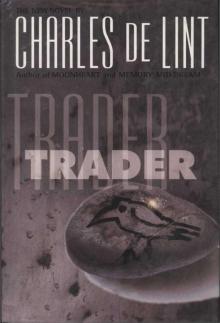 Trader
Trader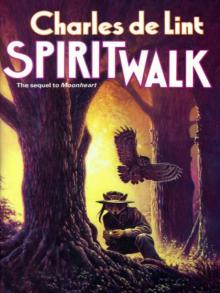 Spiritwalk
Spiritwalk Someplace to Be Flying
Someplace to Be Flying Jack in the Green
Jack in the Green The Valley of Thunder
The Valley of Thunder Out of This World
Out of This World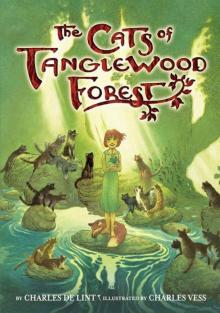 The Cats of Tanglewood Forest
The Cats of Tanglewood Forest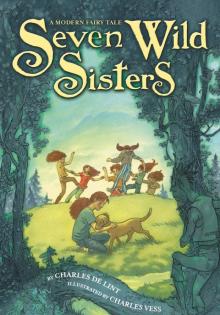 Seven Wild Sisters
Seven Wild Sisters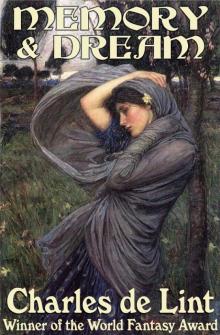 Memory and Dream
Memory and Dream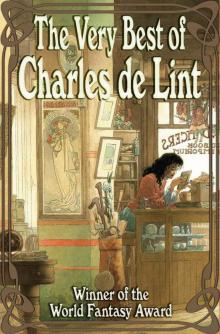 The Very Best of Charles De Lint
The Very Best of Charles De Lint Under My Skin
Under My Skin Forests of the Heart
Forests of the Heart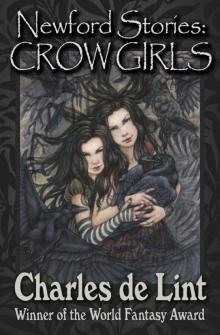 The Newford Stories
The Newford Stories Moonlight and Vines
Moonlight and Vines Angel of Darkness
Angel of Darkness The Onion Girl
The Onion Girl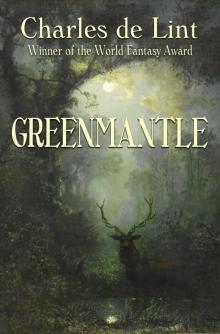 Greenmantle
Greenmantle Waifs And Strays
Waifs And Strays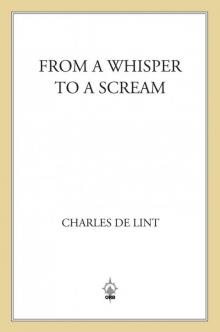 From a Whisper to a Scream
From a Whisper to a Scream Over My Head
Over My Head The Ivory and the Horn n-6
The Ivory and the Horn n-6 Our Lady of the Harbour
Our Lady of the Harbour Dreams Underfoot n-1
Dreams Underfoot n-1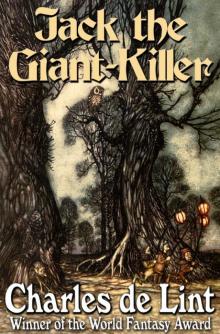 Jack the Giant-Killer (Jack of Kinrowan Book 1)
Jack the Giant-Killer (Jack of Kinrowan Book 1)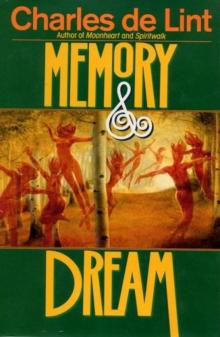 Memory and Dream n-5
Memory and Dream n-5 Under My Skin (Wildlings)
Under My Skin (Wildlings)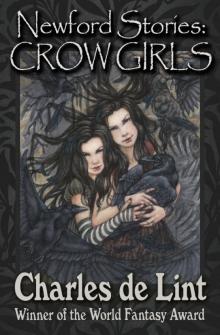 Newford Stories
Newford Stories The Wind in His Heart
The Wind in His Heart Ivory and the Horn
Ivory and the Horn